If your backyard looks like it’s been attacked by mini excavators, you probably have a digging dog. And you’re not alone.
Dogs love to dig in gardens, under fences, or right in the middle of your prized lawn. It’s more than messy. It can be a sign of boredom, escape behavior, anxiety, or just instinct.
If you’re wondering how to stop dogs from digging, this guide walks you through natural, behavior-based methods that work, without punishment, shock tools, or expensive training gadgets.
Let’s get started.
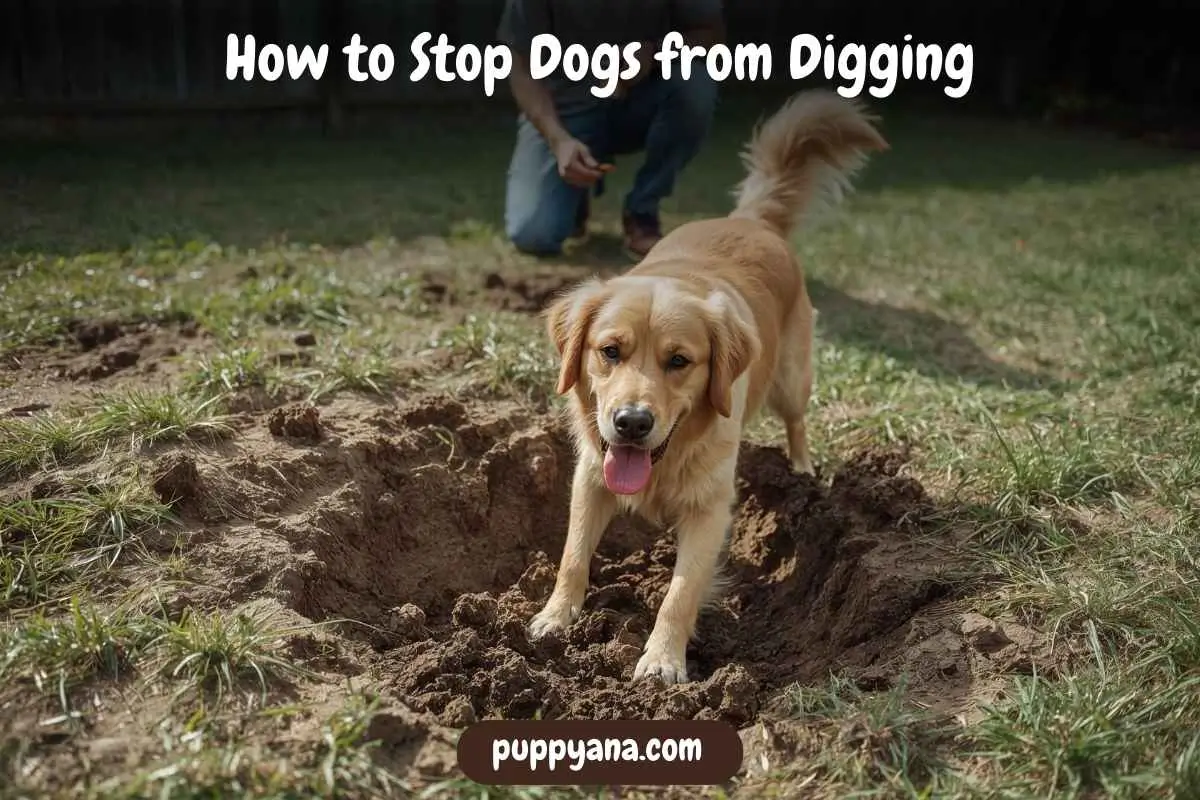
Table of Contents
ToggleWhy Do Dogs Dig?
Before tackling the hole-punching problem, first understand why dogs dig.
According to the AKC’s guide to dog behavior, typical reasons include:
Common Reasons Dogs Dig:
- Boredom or lack of stimulation
- Instinct (especially in terrier breeds)
- Seeking cool spots during hot weather
- Stashing food or toys
- Escaping from yards or fenced areas
- Anxiety or separation stress
- Scent chasing (like mice, moles, or insects underground)
Your job is to match the solution with the cause.
How to Get Rid of Moles or Burrowers Causing Dog Digging
Some dogs dig because something’s literally moving underground, like moles, mice, beetles, or other burrowers. Many dogs with hunting lineage (like Terriers or Beagles) respond specifically to this kind of visual or scent trigger.
Here’s how to stop dogs from digging if they’re hunting underground pests:
- Fill all holes as you find them, don’t leave a “trail”
- Use pet-safe mole deterrents like castor oil granules
- Avoid chemical traps or toxins that can harm your dog
- Flood small tunnels (with a hose) and immediately redirect your dog with toys or food puzzles
Once the underground animals are gone, digging often fades away.
PuppyAna suggests reward-based training to redirect strong prey drive dogs toward commands like “Find it” tied to toys, instead of real prey under your yard.
Is Digging a Normal Dog Behavior?
Yes, digging is totally normal, especially among certain breeds.
Dogs bred for underground hunting (like terriers and dachshunds) will naturally channel their energy into the ground. The Humane Society explains that digging isn’t bad, it’s just sometimes misguided or amplified by environmental issues.
That’s why using behavior-based solutions, not punishment, is the key to success when learning how to stop dogs from digging.
6 Proven Ways to Stop Dogs from Digging
Here’s how to stop dogs from digging without yelling, punishing, or overcomplicating the process.
1. Increase Physical and Mental Exercise
Daily stimulation = less energy for digging.
Do this daily:
- 30+ minutes brisk walk
- Food puzzle toys
- Tug of war
- Nosework or scavenger games
PuppyAna recommends enrichment-focused games like stuffed Kongs, snuffle mats, and hide & seek to redirect digging into brainwork.
2. Fill and Block Previous Holes
Dogs often return to the same digging spots.
Try this fix:
- Fill the hole with soil + dog’s own stool or citrus peels
- Cover with chicken wire for a few days
- Reward your dog when they avoid those spots
- Spray natural deterrents like vinegar or bitter apple
Most dogs stop after 2–3 “ugly feedback” digs.
3. Give Them a Designated Dig Area
Some dogs need an outlet. Provide one!
Build a dig-safe space using:
- Loose sand or soft topsoil
- Shade and a digging cue (toys half-buried inside)
- Frame it with garden edging or old planter boxes
Praise your dog for digging only there. Use the cue “dig here” to help.
PetMD says redirection is more effective than trying to erase the behavior altogether.
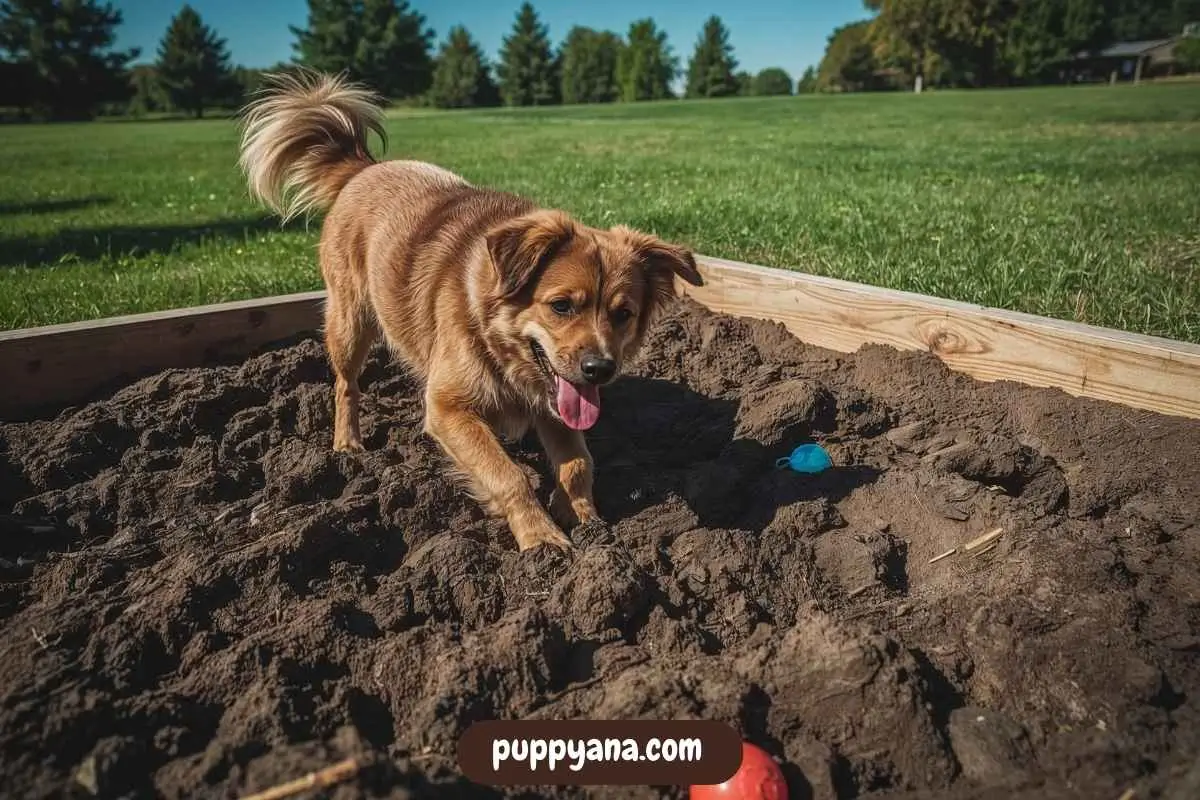
4. Stop Escape Artists with Bury Barriers
If your dog digs along fences or gates, add:
- Buried chicken wire at the base
- Concrete pavers or large rocks
- Install an L-footer under the yard line
- Supervised activity near fence zones
Combine physical blocks with consistent walks to reduce the urge to escape.
5. Keep Them Cool and Rested
Digging out shallow holes may be an attempt to cool off.
Provide:
- Shade areas during hot months
- Kiddie pool with water
- Chill mats or ventilated kennels
- Morning walks instead of midday
PuppyAna encourages dog owners to check paw pads during summer, burns, and dehydration, which can also trigger digging from discomfort.
6. Use Deterrent Scents in Dig Zones
Dogs hate certain smells, including:
- Chili pepper
- Vinegar
- Coffee grounds
- Bitter sprays
Sprinkle deterrent scents where digging persists. Always test for allergens or irritation first.
How to Stop Dogs from Digging When Left Home Alone
Separation anxiety and boredom make unsupervised dogs dig their stress out. Here’s what works:
Solutions for solo hours:
- Rotate toys and chews hidden in the yard
- Use treat-dispensing balls or LickiMats
- Leave soft music or a calming sound
- Provide an outdoor playpen
- Use dog-safe cameras to monitor habit zones
PuppyAna recommends relaxing aids like calming chews or anxiety jackets for long-alone dogs.
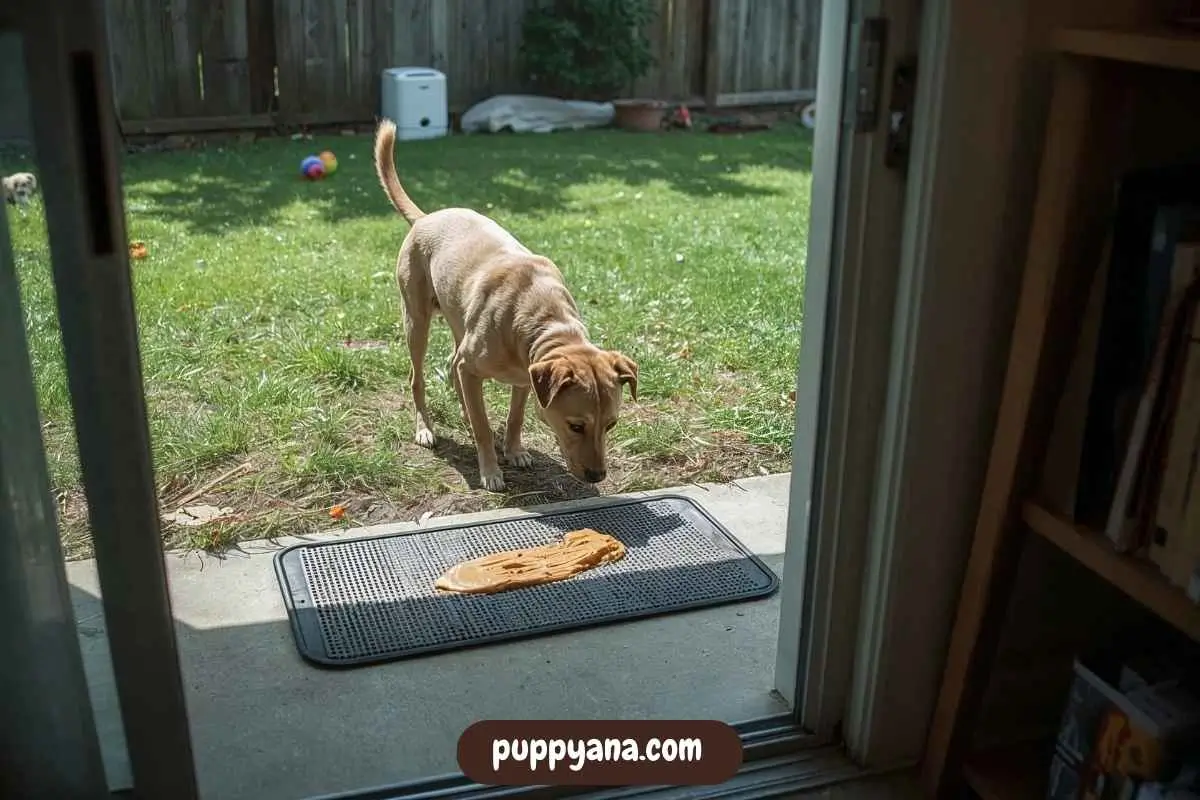
How to Stop Dogs from Digging in the Same Spot
Dogs form habit spots.
Here’s what you can do:
- Disrupt the soil texture (add pebbles or netting)
- Spray vinegar and water mixture
- Insert safe boundary objects like decor or cinder blocks
- Withhold toys buried in that area
- Supervise and redirect consistently
Habits shift within 7 to 14 days when consistency is applied.
How to Stop Dogs from Digging Under the House or Deck
Digging under decks, porches, or crawlspaces is extra risky, it can lead to escape, injury, or unwanted denning behavior (especially in intact females).
Here’s how to stop dogs from digging in these hard-to-reach spots:
Preventative Measures:
- Block access with lattice fencing and ground anchors
- Fill under-deck space with gravel or river rock
- Line perimeter with partially buried chicken wire or an L-footer
- Apply harmless deterrents like citrus-soaked cloth strips
If your dog is digging to nest, check with your vet about spaying and hormonal behavior.
PuppyAna cautions owners not to overlook under-deck zones, they’re a common escape route for stressed or bored dogs.
How to Stop Dogs from Digging Up Plants and Gardens
Is your garden under attack? Try these protective tactics.
Tips for plant protection:
- Use raised garden beds
- Place dog fencing or mesh around beds
- Spray natural deterrents like citrus-infused vinegar
- Distract with enticing dig zones or sandbox nearby
- Provide cooling mats to prevent overheating motives
Dogs may dig where you’ve recently watered or disturbed soil, avoid visible “cues” after gardening.
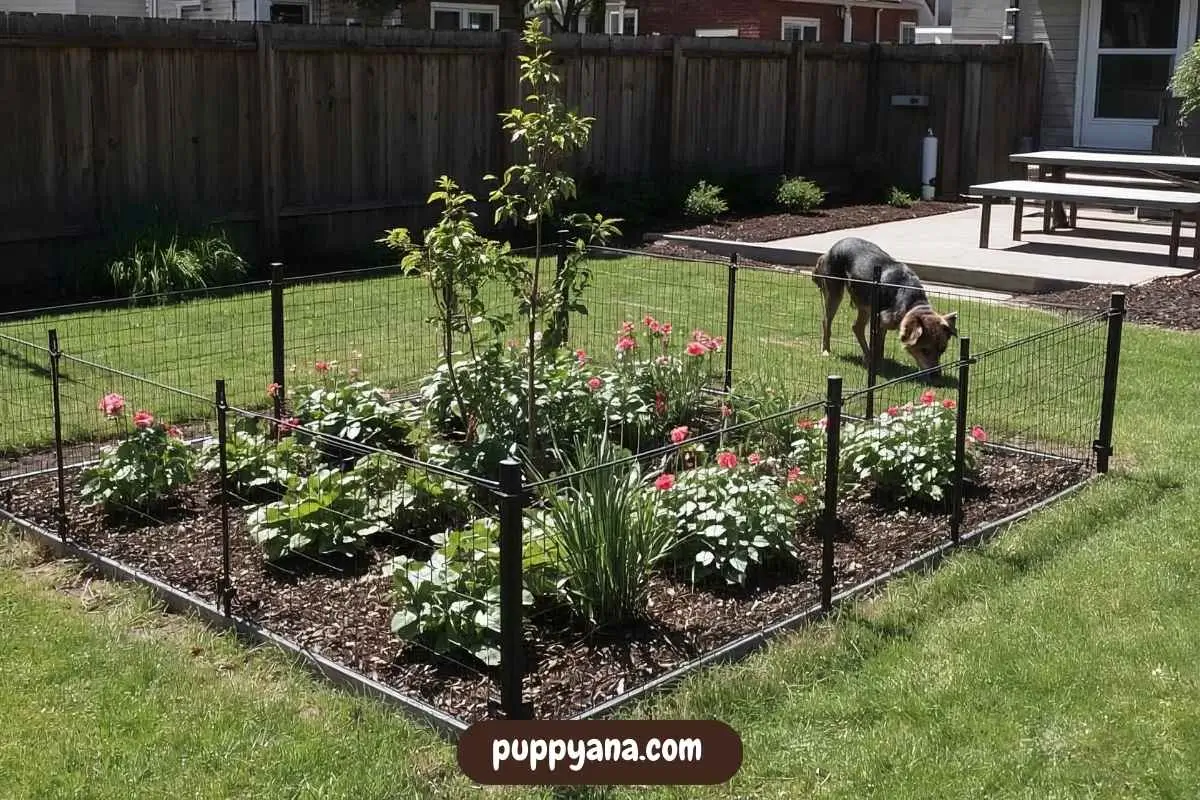
How to Stop Dogs from Digging in Winter
Some dogs dig snow dens or winter holes. If digging picks up in colder months:
Winter Digging Fixes:
- Keep snow cleared from favorite areas
- Use raised beds away from fence lines
- Improve indoor enrichment during cold days
- Bundle short-haired dogs with warmwear to reduce discomfort
If your dog is a “cold weather digger,” redirect that energy via indoor activities like puzzle toys.
How to Stop Dogs from Digging at the Beach or Park
Some dogs become mini excavators during outdoor adventures, especially at dog parks, trails, or beaches with soft sand.
Here’s how to stop dogs from digging in public outdoor spaces:
Tips That Work:
- Keep your dog on a leash, especially during early training
- Use a “leave it” or “let’s go” cue to redirect
- Bring engaging toys to divert digging instincts into fetch or sniff games
- Avoid areas with loose dirt or mulch if you’re still training
- Reinforce calm behavior with treats when walking past tempting spots
The ASPCA highlights that consistency in commands during walks builds stronger off-leash control over time.
PuppyAna advises bringing a “dig distraction kit” on outings, like a favorite chew or toy that redirects energy away from digging zones.
Should You Use Bark or Mulch to Stop Digging?
Covering your yard in mulch or bark can help, but use the right kind.
Use:
- Cedar mulch
- Large bark nuggets
- Gravel or sand (in dig zone only)
Avoid:
- Cocoa mulch (toxic to dogs)
- Sharp landscaping stones
- Fertilizers in mulch (check label)
PuppyAna recommends using materials marked “pet-safe” as substitutes for grass in frequently dug zones, especially for high-energy dogs.
When to Get a Dog Trainer Involved
If you’ve tried everything and your dog:
- Keeps digging regularly
- Still escapes the yard
- Digs despite redirection
- Shows signs of anxiety
It’s time to ask for help.
Look for a positive reinforcement trainer with experience in drive-related behaviors (e.g. prey drive + working breeds).
Sometimes, underlying issues like compulsive disorders or fear require extra behavioral support.
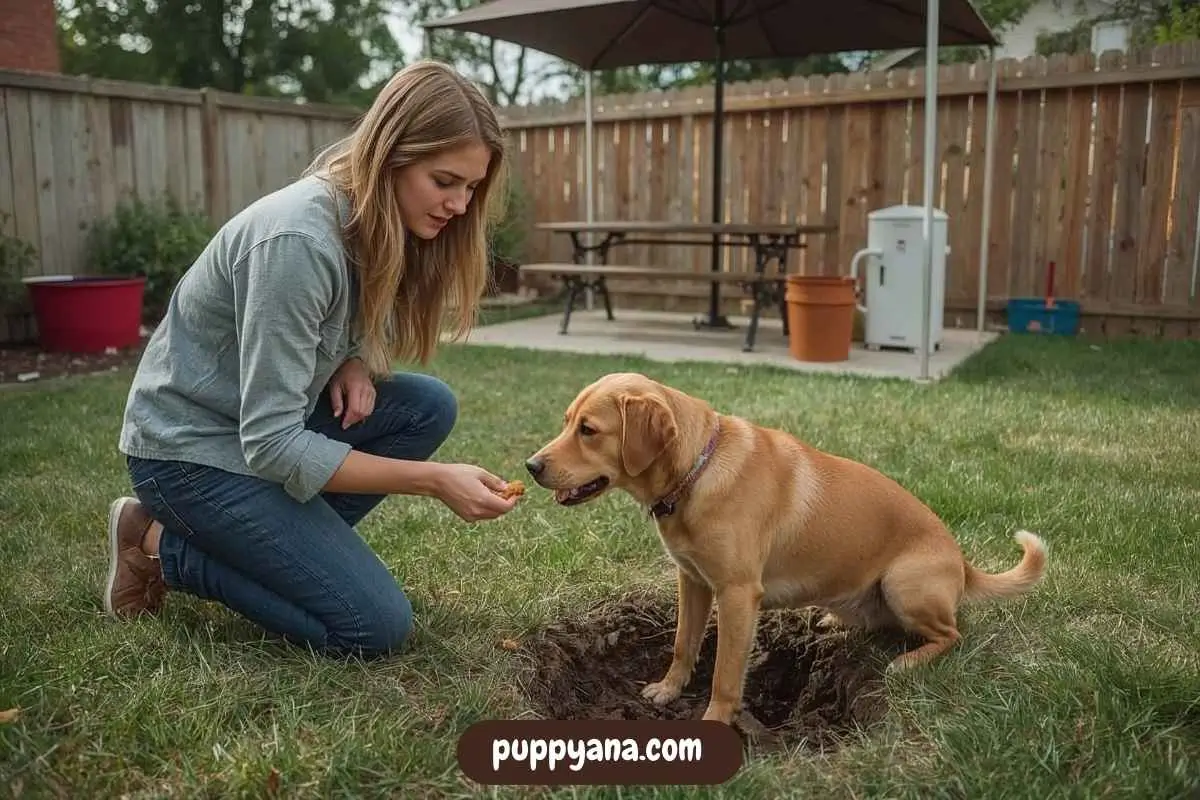
Conclusion
Now that you know how to stop dogs from digging, it’s time to put it into action.
Start with:
- Identifying the reason
- Reducing triggers
- Providing redirection—like toys, dig zones, and attention
- Blocking escape routes and deterrent zones
PuppyAna reminds pet owners that digging is not disobedience, it’s communication. And with the right blend of reward, prevention, and structure, your dog can love the outdoors without wrecking your yard.
Frequently Asked Questions
What breed digs the most?
Terriers and hounds (like Beagles) are most prone. Huskies, Labs, and Dachshunds are also regular diggers, especially in yards.
Can diet affect digging?
Yes, low-protein or poor energy diets can leave dogs restless or seeking other outlets like digging.
How long does it take to train a dog to stop digging?
Many dogs respond in 1–2 weeks with consistent redirection and environmental control.
Should I punish my dog for digging?
No. Use management and redirection, punishment can create stress and worsen behavior.
Do digging sprays really work?
Sometimes, especially when mixed with supervision. Use them as a tool, not a total fix.





